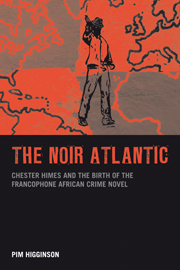Book contents
- Frontmatter
- Contents
- Acknowledgements
- Introduction: The Frivolous Literary
- 1 “Pas de littérature”: Abasse Ndione and the Rise of Crime
- 2 Minor Mistranslations: Simon Njami and the Making of a Parisianist Himes
- 3 Crime Pays: Achille Ngoye and the Série noire
- 4 Ethnographic Erotics: Bolya and the Writing of the Other
- 5 Terreur Rose: Kouty, mémoire de sang and the Gendering of Noir
- 6 Going out Blazing: Mongo Beti's Last Two Novels
- Bibliography
- Index
6 - Going out Blazing: Mongo Beti's Last Two Novels
- Frontmatter
- Contents
- Acknowledgements
- Introduction: The Frivolous Literary
- 1 “Pas de littérature”: Abasse Ndione and the Rise of Crime
- 2 Minor Mistranslations: Simon Njami and the Making of a Parisianist Himes
- 3 Crime Pays: Achille Ngoye and the Série noire
- 4 Ethnographic Erotics: Bolya and the Writing of the Other
- 5 Terreur Rose: Kouty, mémoire de sang and the Gendering of Noir
- 6 Going out Blazing: Mongo Beti's Last Two Novels
- Bibliography
- Index
Summary
After nearly four decades of self-imposed exile in France, Mongo Beti returned to Cameroon in 1993 and opened a bookstore, the Librairie des Peuples noirs. Famous as one of the most “engaged” African writers, through novels and essays such as Ville cruelle and “Afrique noire, littérature rose,” Beti had long asserted that the purpose of his literary production was to speak to the Cameroonian people. Despite a reputation that was powerful enough to ensure his safety under Paul Biya's dictatorship, Beti sensed that he was not reaching his desired audience; people could not afford his books and found his writing too political, too serious. At this moment of aesthetic and ideological doubt, Beti decided to listen to a quasi-literary agent, “qui m'avait suggéré de changer un peu ma manière d'écrire.” Given that he had spent well over forty years as a thematic and technical pioneer, this seemed like a radical solution; nevertheless, Beti promised to try, “en lui expliquant [que] je suis un grand admirateur de Chester Himes, un passionné des romans policiers.” He concludes, “[j]e vais essayer de faire dans le genre.”
As he undoubtedly knew, the association of “faire dans le genre” (emphasis added) and Chester Himes was rich with potential; the American used crime fiction to solve similar problems of literary engagement and fluctuating readership. Beti's crime fiction thus operates within a Black Atlantic gesture and appeals to the complex histories connecting Africa to the United States and France. Whereas fame eluded Himes in his homeland, he found it in France and in French (a language he never learned).
- Type
- Chapter
- Information
- The Noir AtlanticChester Himes and the Birth of the Francophone African Crime Novel, pp. 168 - 198Publisher: Liverpool University PressPrint publication year: 2011



